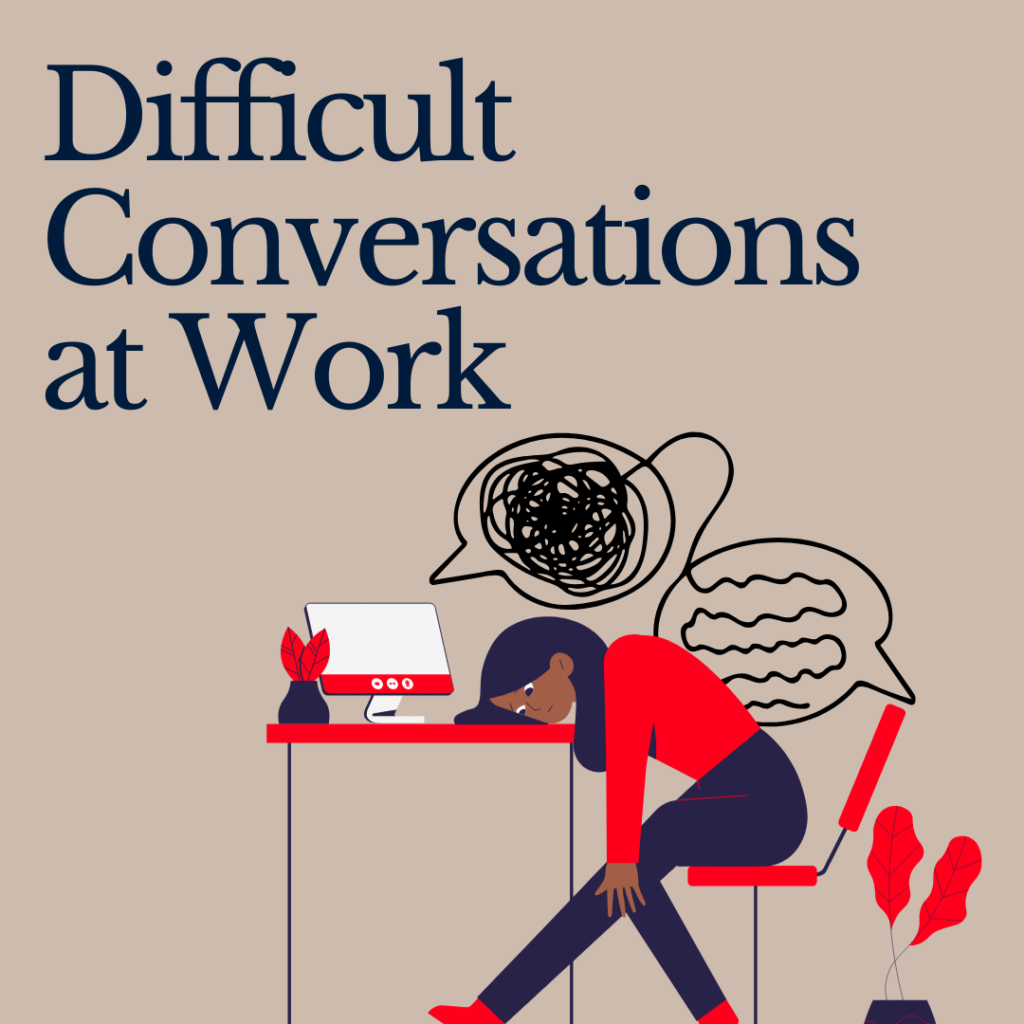Employee engagement is vital for optimising your business strategy and performance. One of the more difficult parts of engagement however is being able to effectively handle having difficult conversations at work. It’s difficult but it’s important – and if mishandled or avoided all together it can result in some disastrous outcomes for staff morale, health and engagement and then consequently, overall business performance.
So, what is a ‘difficult’ conversation? What impact does it have? What’s the point of training? We’re answering these queries, along with some other, some frequently asked questions in this article, and infusing it with some tips and suggestions courtesy of our resident Senior People Specialist.
Q: What is a Difficult Conversation?
The term ‘difficult conversation’ usually refers to conversations that are, well, difficult to have. They can produce a sense of uncomfortableness generally because they may involve sensitive topics and people that we care about, can evoke strong responses and emotions and may be confrontational. Although they’re a normal part of everyday life, they’re often avoided out of fear of triggering negative emotions or responses, when in fact it’s often the act of avoiding or mishandling these conversations that can really contribute to negative outcomes.
Types of difficult conversations include:
- Discussions around performance & development
- Role clarity, work or project expectations
- Differing work styles
- Underperformance
- Misalignment of behaviour and values
- Misconduct
Q: What’s the Benefit of Participating in ‘Difficult Conversation’ Training?
It helps build and strengthen both individual and organisational capability. Workplace Wizards’ training packages are tailored according to your needs and business and delivered to you by expert workplace relations consultants, experienced in managing workplace relations issues and helping clients across different industries in Australia to navigate through a variety of people and culture challenges.
Secondly, it also has a unique peer-to-peer learning aspect. Training isn’t just about learning from the facilitator; it’s also an opportunity to create a shared learning experience, boosting team bonding by connecting and learning with and from each other. Additionally, it can also help reinforce what you already know, and gives you an opportunity to put theory into practice –utilising the time to iron out any bumps in your strategy and have your questions answered.
You also walk away with frameworks, models, and practices that you can apply to your role and your workplace right away.
Q: What’s a Common ‘Difficult Conversation’ That People may be Avoiding in the Workplace, with or Without Realising?
One of the more common ‘difficult’ conversations that workplaces might be unknowingly avoiding is conversations around workload and role design. The workload issue isn’t new to many of us – after all statistics suggest that 90% of us are experiencing some form of burnout linked to workload – however it’s one that’s not raised in the workplace often.
Why? A multitude of reasons including: a fear of perception of failure or not coping, a culture of being ‘over worked’ that has been readily accepted as the status quo, or a lack of psychological safety in speaking up about experiencing difficulties at work.
The consequences of ignoring or not addressing unreasonable or unsustainable workloads can lead to burn out, dissatisfaction and disengagement, poor health and morale and with time can also lead to decreasing levels of motivation, productivity and performance. It can also lead to higher levels of employee turnover.
As we tend to take role design and position descriptions as an often static process or concept, we may underestimate the importance of regularly reviewing and, if necessary, redesigning roles to align with the evolution of the role and organisation. While discussions around role design might not be perceived as ‘difficult’, they might be perceived as time-consuming and/or unnecessary. For clarity of expectations and how each role contributes to the organisations strategy (which improves employee engagement), we recommend regular conversations focused on role design – this also gives your employees an opportunity to contribute to the design of their role and type of work performed according to their strengths, increasing overall individual, team and business performance.
Q. Beyond Productivity, Can Avoiding or Mishandling Difficult Conversations Have an Impact on Mental Health?
Short answer – yes. The problems arising from avoiding conversations about someone’s performance, behaviour or attitude are often twofold. One, it doesn’t give the employee an opportunity to redirect their behaviour or attitude or to improve their performance, and secondly, it puts pressure on others in the team to pick up slack or work around the issue at hand, leading to overburdened workloads, low morale and decreased motivation.
Mishandled difficult conversations may also lead to unnecessary antagonism and can negatively impact the mental health of the parties involved – they may feel undervalued, targeted, put under undue pressure or experience a sense of unfairness and resentment. The good news is, by having effective conversations early on, issues may be resolved before they snowball into grievances, complaints, performance management, disciplinary action and or dismissal.
Remember also, the effects of unresolved workplace conflict are also not isolated to just the parties directly involved. Having even just one team member feel negative, overworked, under valued, at odds with management, and/or like they’re forced to tip-toe around certain issues or people, can spread and affect the entire working environment and culture. These issues can then also seep into the personal lives of the affected individual, and potentially impact their overall health.
A Success Story
Lorraine reflects on a small ‘win’ she recently experienced working with a client on handling difficult conversations:
“It was really uncharted territory for them [the client] to have performance management discussions, so I sat down with them to talk about the situation and helped them create and implement a performance management program for their leaders. The feedback I received was that after implementing a robust program, they felt much more comfortable moving forward with handling difficult conversations because they were now armed with the knowledge and skills necessary to handle those appropriately, effectively and positively”
Q: What’s Something That People Do in the Workplace That They Think Is Handling or Having a Difficult Conversation but Is in Actual Fact Avoidance or a ‘Band-Aid’ Solution?
Raising concerns, providing feedback or having a difficult conversation in a performance review for the first time.
Often we see managers waiting until the formal performance review process to give feedback or attempt to address issues that arose months ago. This approach is highly ineffective and an opportunity to redirect focus or improve performance in real time has been missed. There should be no surprises when it comes to areas of concern or development during performance reviews. Regular and consistent feedback, in real time, is key to employee engagement, retention and business performance.
Why are difficult conversations often left on the back burner? It could it be a fear of confrontation or conflict, not wanting to upset the other person, not prioritising the importance of these (“I’ll do it later”), or not knowing how to start these sorts of conversations in the first place. One thing is for certain however – avoiding or missing the timing to address issues or concerns head-on often leads to ineffective outcomes and can create a risk to the relationship between employees and managers.
Equipping your people managers, particularly those with great technical experience and knowledge, but minimal people management experience, will not only provide them with confidence in tackling challenging issues, it will also improve positive and productive relationships, individual, team and business performance and overall employee engagement.
Need Some Help?
These are not one size fits all answers – they’re largely general and there are several factors, specific to your unique situation and workplace dynamic, that can determine how to best approach a difficult conversation.
Workplace Wizards has a team of legally trained employment consultants who have worked with a variety of businesses to help resolve workplace issues. We provide a variety of different training packages to help find workplace solutions as well.
Whether it’s training, refining policies or reviewing employee contracts – we can help ensure peace of mind with specialist advice catered for your unique business need and goals. Reach out to find out what we can offer by way of workplace solutions for your business. You can call us on 03 9087 6949 or email support@workplacewizards.com.au.
We’ve also got other blog posts looking at specific difficult conversations such as those centred around resignations & terminations types of workplace conflicts & resolutions. You might also be interested in our article covering quick tips on handling difficult conversations in every day situations.




Comments are closed.